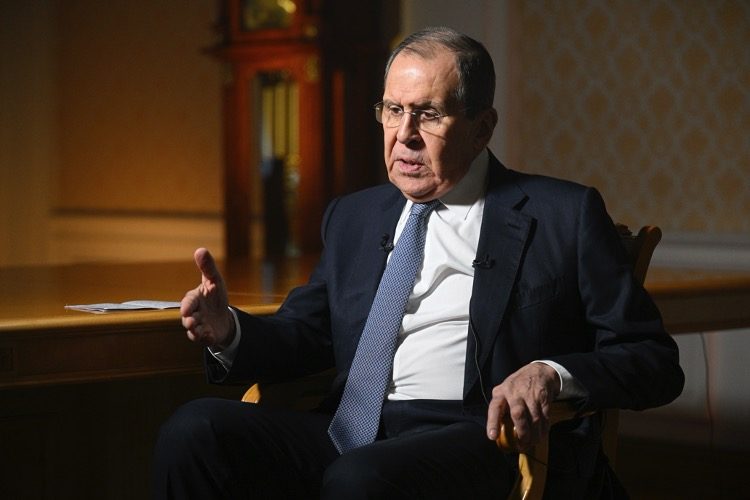
Russian Foreign Minister Sergey Lavrov told CBS News in an exclusive interview on January 23 that there would not be a difference in Russia’s actions in Ukraine if former U.S. President Donald Trump is elected November.
“As for who [Trump or Biden] is more promising for Russia. I don’t believe that there is any difference, because the drive to ruin the Russian-American relations, the foundation of these relations, including all agreements on strategic stability, parity, mutual trust, inspections, transparency, and so on and so forth, confidence-building, all these started to be ruined by President George Bush Jr,” Lavrov declared.
America’s general stance toward Russia has not changed over the past decades, Lavrov said, elaborating that Washington itself had undermined its ties with Moscow by dismantling all the “confidence-building” mechanisms and jeopardizing mutual trust.
Lavrov noted former U.S. President George W. Bush’s move to pull out from the Anti-Ballistic Missile (ABM) Treaty in 2002. The key arms-control agreement signed by the United States and the USSR in 1972 restricted the number of ballistic missile defense systems each side could have and was designed to diffuse tensions between the two Cold War rivals.
Washington has since eroded the “foundations” of bilateral relations with Russia by terminating “all agreements on strategic stability, parity, mutual trust, inspections and transparency,” Lavrov said. Trump himself played a crucial role in dismantling one of the few remaining arms control treaties — the Intermediate-Range Nuclear Forces (INF) Agreement, which forbade both nations from having any ground-launched missiles with ranges between 500 and 5,500 kilometers.
The United States first unilaterally suspended the INF Treaty in February 2019, during Trump’s presidency, and then backed out from it in August of the same year. Russia suspended the agreement in February after the initial American move.
Furthermore, Lavrov claimed that Washington is still too preoccupied with its own perceived “superiority” and “impunity” to amend its approach to relations with Moscow. The U.S. leaders had “ignored [the] huge amount of goodwill shown by Putin during his first two terms,” the Russian minister said, adding that American politicians apparently tried to keep the Russian president “in their pocket.”
They had “miscalculated everything,” Moscow’s top diplomat maintained, elaborating that the present generation of U.S. politicians had not learned a “single lesson” from the errors of their predecessors.
When questioned by his interviewer on how to improve Russia-U.S. ties, Lavrov responded:
“We never spoiled these relations. We’re not going to take any initiative, and go to run to Washington. «Uncle Sam, please forgive us. We were bad boys». We have nothing to complain about. Those who invented the Russian threat, those who ignored, huge amount of goodwill shown by President Vladimir Putin during his first two terms. They just said, okay, this guy is so nice — we will keep him in our pocket. Those who miscalculated everything, they must rethink.”
When asked by his interviewer what advice he would give to the United States to address the current crisis in the Middle East, Lavrov stated that the United States should play its part to “stop the fighting.” He elaborated:
“Don’t use veto when a resolution is proposed to declare humanitarian ceasefire. You used vetoes twice. There is no reaction from the Security Council as regards to demand a ceasefire. And of course, don’t drag on like your predecessors did for decades on creating the Palestinian state. Join others as an honest participant. Don’t try to monopolize the process thinking only about how you can guarantee your own interests and not the interests of the Palestinian people.”
In recent months, Trump has on various occasions pledged to ease tensions between Moscow and Kiev and Israel and Hamas. The former U.S. president particularly asserted that he would be able to quickly persuade both Putin and Ukrainian President Volodymyr Zelensky to sit down at the negotiating table since he allegedly knew both leaders “well.”
Moscow dismissed allegations that it had conducted talks with Trump regarding peace with Kyiv.
“There have been no contacts on this issue,” Kremlin spokesman Dmitry Peskov said.
During his time as president, Trump’s alleged ties with Russian President Vladimir Putin were subject to scrutiny, with Trump challenging accusations from his political enemies that the Russian leader had meddled on his behalf during the 2016 U.S. presidential elections. The former U.S. president had also repeatedly boasted about his good relations with Putin.
Oleg Tsaryov, a former Ukrainian lawmaker who joined the pro-Russia separatists in the Donbas region in 2014, reacted to Lavrov’s aforementioned remarks, stating in a Telegram post that the situation regarding the Russia-Ukraine conflict would be the same under Trump, concurring with Lavrov’s remark to CBS that “as for who is more promising for Russia, I don’t believe that there is any difference.”
“I agree with Sergei Lavrov. The U.S. under Trump would have reacted the same way or even more harshly,” Tsaryov wrote. “Trump has only paid lip service to being ready to get along with Putin.”
In his most recent Telegram post, Tsaryov pointed out that “there was no easing of the sanctions regime against Russia. Trump said one thing and did another,” alluding to sanctions put in place following Russia’s annexation of Crimea in 2014.
Under Trump, Ukraine also obtained Javelin missiles, which together with British arms “caused us a lot of trouble” near Kyiv, he added.
Besides, Tsaryov claimed that even under the Trump administration, there were U.S. missile strikes on Syria and that Qasem Soleimani, the head of the Iranian Islamic Revolutionary Guard Corps, had been killed in 2020 during his presidency.
“Trump’s actions are reckless and very bold,” he said. “One can only guess how he would have behaved with the beginning of the SMO [special military operation],” he added, referring to Moscow’s term for its actions in Ukraine. “Biden is truly afraid of a Russian nuclear response. His actions are careful and measured. I’m afraid Trump could be more decisive,” Tsaryov posited.



